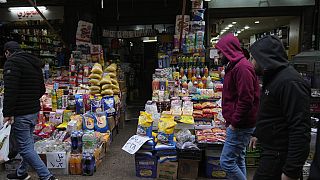Kenya
On the shores of Lake Victoria, Nairobi-based green energy supplier Biogas International is piloting a project that's converting the invasive water hyacinth plant into cleaner cooking fuel.
Workers harvest the plants with their bare hands, then grind them into a machine to produce a mixture that's then fed to biogas digesters.
"To some people, they see hyacinth as a curse, but I think it is just a matter of enlightening them or sensitizing them on what's the importance of hyacinth on Lake Victoria. Because to us, we understand that it is really cleaning the water. So, we don't need to look at it as a curse," says plant supervisor Daniel Odhiambo.
"We need to look at it as an opportunity, that we can use it to do (make) biogas. It can do making papers, it can do making of chairs and furniture. So, we don't need to look at it a hundred percent as a curse."
Through a partnership with pharmaceutical giant AstraZeneca, Biogas International is discouraging the use of wood fuel, instead providing 50 homes in the Kenyan city Kisumu (360 kilometers from Nairobi) with biogas digesters.
"In Africa, upwards of 70 to 80 percent of the population of sub-Sahara use wood fuel," says Biogas International chief executive Dominic Kahumbu.
"Yet we've got these invasive species all around us. So, when we cut down our trees for charcoal or firewood, we are reducing the carbon sink."
According to Kahumbu, most of the biogas digesters have been provided to elderly people susceptible to health problems brought on by smoke from wood fuels.
Water hyacinth has engulfed Lake Victoria and negatively impacted its ecosystem by preventing aquatic life from accessing adequate sunlight.
The plants also promote the breeding of mosquitoes around Lake Victoria, but Kahumbu says it also has some benefits.
"The biggest advantage of water hyacinth is that it makes excellent biogas," he says.
"Which means that the nutrients are ending up in the river from all the towns, cities and settlements all the way downstream, ending up in the lake, the water hyacinth is harvesting those nutrients, we harvest the water hyacinth, we get back the nutrients, and then we also get the energy."
According to fish traders on the shores of Lake Victoria, the biogas is cheaper than firewood.
36-year-old fish monger Esther Ongoye says she spends 600 Kenyan shillings (approx. $5.3) on firewood every day, unlike her fellow traders who spend 300 Kenyan shillings (approx. $2.6) on biogas.
"We would like to use biogas, but it is not readily available, and that is why I am still using firewood," she says.
"If they make it readily available, then we will switch to biogas because it is cheaper than firewood."
According to Kahumbu, it costs about $650 to install the system thus making it unaffordable for many Kenyans.
Biogas is a combustible gaseous fuel that's collected from the microbial degradation of organic matter in anaerobic conditions.
According to nonprofit the Environmental Defense Fund, biogas is typically about two-thirds methane and one-third carbon dioxide (CO2), both are climate pollutants.
Burning it still creates CO2 emissions, but as the biogas was derived from plants - in this case the water hyacinth, which naturally remove CO2 from the atmosphere - the CO2 emissions are generally considered climate-neutral as relatively little fossil carbon is added to the atmosphere.











00:24
Greenland and Iceland saw record heat in May
01:34
EU commits €1 billion to protect oceans under a new pact
01:30
Macron sparks global push to protect oceans
01:45
How cutting off rhino horns might help curb poaching
01:06
Experts warn of an increase in Glacier-related risks from climate change
01:39
Hundreds dead and missing after Nigerian town submerged by floods